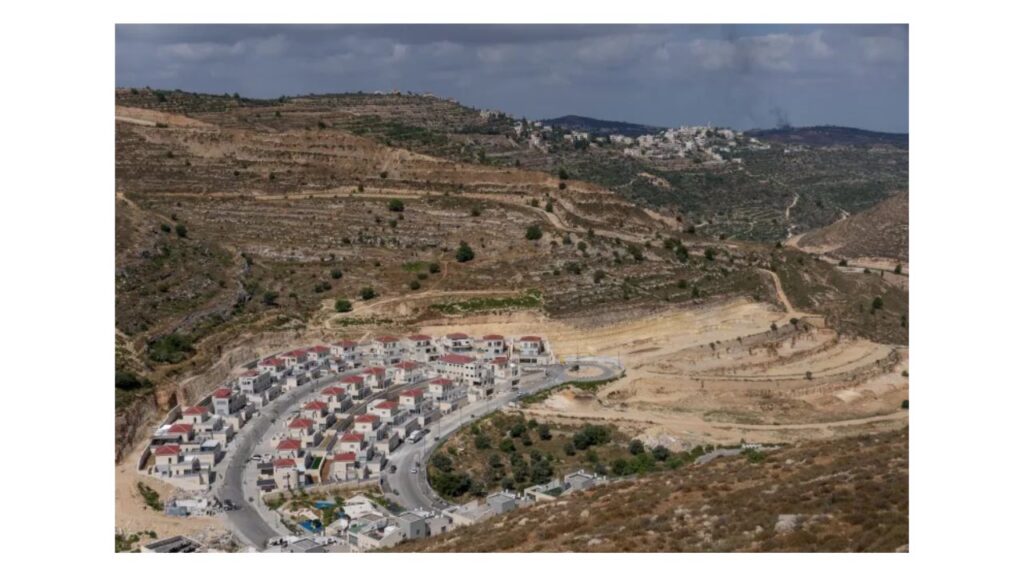According to the International Court of Justice, Israel is annexing territory by its policies in the occupied Palestinian area.
Israel’s continuous presence in the occupied Palestinian territories is illegal, according to the International Court of Justice (ICJ), and it should terminate “as rapidly as possible.”
The 15-judge panel’s nonbinding advisory decision on Israel’s occupation of Palestinian territory was read out by Nawaf Salam, president of the International Court of Justice (ICJ) in The Hague, on Friday.
The judges cited a long list of actions that they claimed broke international law, including the establishment and growth of Israeli settlements in the West Bank and East Jerusalem, the exploitation of the region’s natural resources, the annexation and imposition of permanent control over lands, and discriminatory measures against the Palestinian people.
The court ruled that Israel is undermining the Palestinian people’s right to self-determination, has no right to sovereignty over the territories, and is breaking international law prohibiting the acquisition of land by force.
‘According to it, foreign countries had an obligation to refrain from “rendering aid or assistance in maintaining” Israel’s presence in the region. A summary of the more than 80-page opinion handed out by Salam stated that Israel must immediately cease development of new settlements and evacuate any existing ones.
The court declared that Israel’s “presence in the occupied Palestinian territory is unlawful” due to its “abuse of its status as the occupying power.”
The West Bank and East Jerusalem Israeli settlements, along with the government that supports them, have been founded and are being maintained in violation of international law, the court declared.
The United Nations General Assembly requested the court’s opinion in 2022.
The World Court, or International Court of Justice, is the highest UN tribunal for adjudicating conflicts between states.
During a 1967 conflict, Israel took control of the West Bank, Gaza Strip, and East Jerusalem—regions of ancient Palestine that the Palestinians desire to become a state. Since then, it has constructed and gradually increased the number of settlements in the West Bank and East Jerusalem. Prior to its pullout in 2005, it established settlements in Gaza as well.
The vast majority of the international community and the UN consider the Palestinian territory to be under Israeli occupation.
‘Watershed moment’
Reporters at The Hague were informed by Palestinian Foreign Minister Riyad Maliki that the decision was a “watershed moment for Palestine, for justice, and for international law.”
The ICJ’s historic decision satisfied both its legal and moral obligations. The unambiguous commitments that all states now have to uphold are to provide Israel with no aid, assistance, complicity, money, weapons, commerce, or anything else—in other words, to refrain from supporting its illegal occupation of Palestine,” he stated.
The decision, according to Palestinian ambassador to the UN Riyad Mansour, is a “significant step” toward the end of the occupation and the realization of the Palestinian people’s fundamental rights, which include the right to return, statehood, and self-determination.

The demand for the right to return is made by Palestinians who were displaced from their homes during the 1948 Nakba and the 1967 Arab-Israeli War.
Mansour declared that his group would “dissect every sentence” in the opinion.
He declared, “We will produce a masterpiece of a resolution” before the UN General Assembly, adding, “We will consult with an army of friends at the UN and in all corners of the globe.”
The opinion was dismissed by Israel’s Ministry of Foreign Affairs as biased and “fundamentally wrong.”
The office of Israeli Prime Minister Benjamin Netanyahu declared that “the Jewish people are not occupiers in their own land” and referred to the finding as a “decision of lies” that warped the facts.
Human rights attorney Jeffrey Nice told Al Jazeera that although the ICJ verdict is not legally enforceable, it will be difficult for international leaders to fully “disregard” it.
He stated, “This is one way the legal system is saying enough is enough.”
It would also be “difficult for the interested, informed, concerned public to remain silent on the urgent need for Israel to put its house in order,” according to him.
“There is a lot of room for hope that this ruling will support a movement, an international movement, across the board in the West and elsewhere in the world in favor of more sanctions, more pressure on Western governments to put more pressure on Israel,” stated Marwan Bishara, senior political analyst for Al Jazeera.
The International Court of Justice is debating claims that Israel is carrying out genocide in its conflict with Gaza in a different case that South Africa filed.
In that instance, the court has already rendered a preliminary verdict, directing Israel to enhance humanitarian aid supplies while also forbidding and punishing incitement to genocide.
The International Court of Justice (ICJ) likewise directed Israel to cease its attack on Rafah, a city in southern Gaza, in May, noting the “immense risk” to the hundreds of thousands of Palestinians seeking refuge there. However, Israel has persisted in attacking Gaza, particularly Rafah, notwithstanding the UN court’s ruling.
